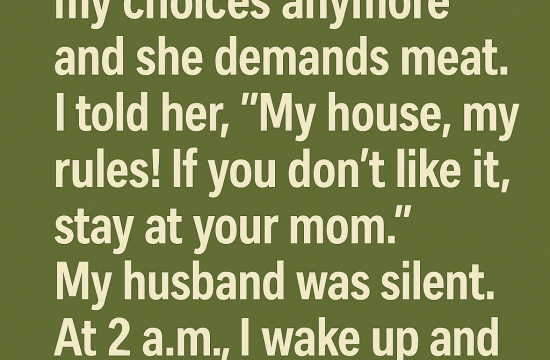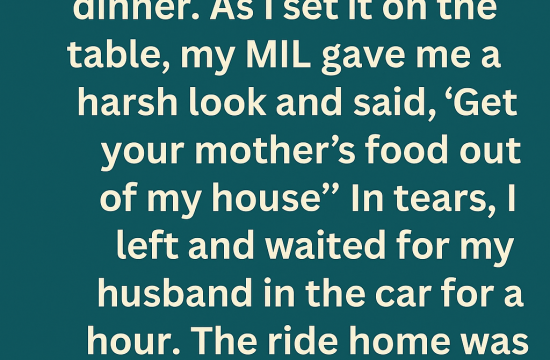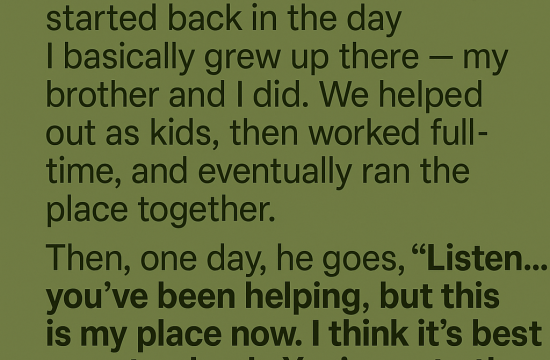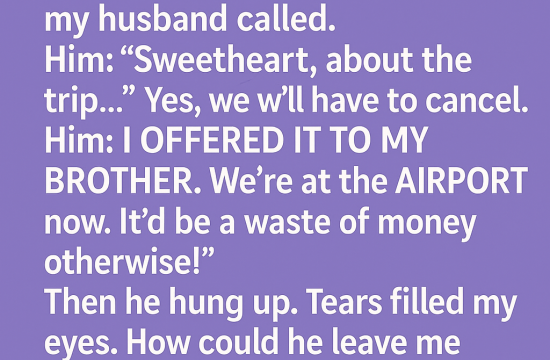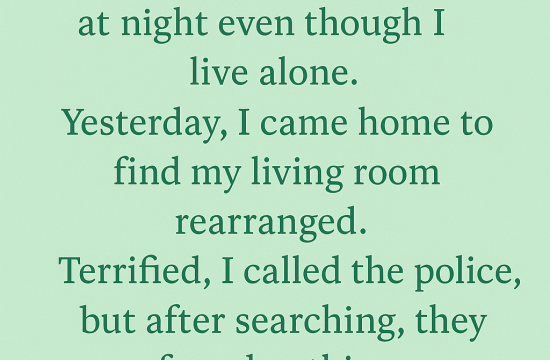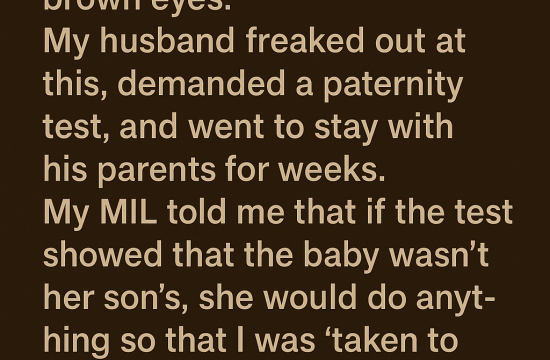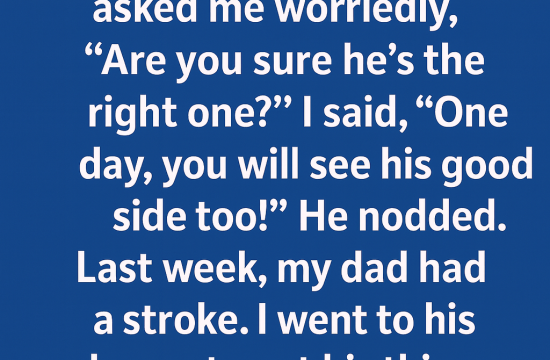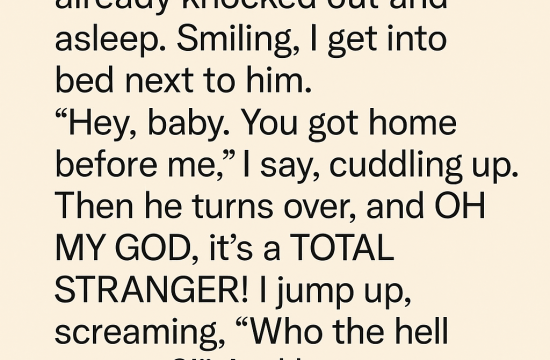PART ONE:
I found my prom dress at a thrift store for $12 — and what I discovered inside changed three lives forever.
I was never the loud one in class. I was the quiet kid—the one teachers nodded at approvingly during parent conferences, whispering phrases like “bright future” as if saying it too loud might break the spell. But back at home, in our cramped kitchen where Mom counted grocery money in crumpled singles, “bright future” sounded more like a distant promise than a plan. And promises didn’t put food on the table.
Dad left when I was seven. No goodbyes, no explanations—just a bag over his shoulder and silence in his place. Since then, it had been just the three of us: Mom, Grandma, and me. We lived in a house filled with secondhand furniture, chipped dishes, and faded family photos—but it was also filled with love. Love that quietly filled the gaps where money should’ve been.
When prom season rolled around, I didn’t even ask for a dress. I couldn’t bear to see that look on Mom’s face again—the one where she wanted to say yes, but couldn’t. I knew what she’d say. So I said nothing.
But Grandma wasn’t the type to let a dream die without a fight.
“You’d be surprised what people give away,” she said with a twinkle in her eye one afternoon. “Come on. Let’s go treasure hunting.”
That was her code for thrift shopping—“treasure hunting.” She always made it sound like we were adventurers, not people scraping by.
The Goodwill downtown smelled like old books and forgotten stories. Grandma moved through the aisles like a woman on a mission, fingers gliding across hangers like she was reading secrets in the fabric.
Most of the dresses were neon disasters from the ’80s or crushed velvet nightmares. But then I saw it.
Midnight blue. Floor-length. Delicate lace along the back. Elegant in a way that didn’t make sense for a thrift store.
“Grandma,” I whispered, almost afraid speaking would make it vanish.
She turned, took one look, and said, “Well, I’ll be damned.”
The tag read $12. It looked brand-new. Easily worth hundreds.
“Sometimes the universe gives you exactly what you need,” she said, lifting it gently from the rack.
At home, she laid the dress out like something sacred and started tailoring it with the precision of someone who’d been sewing longer than I’d been alive. I sat beside her, holding pins and passing thread, watching her weathered hands work their magic.
“Hand me that seam ripper, honey,” she said, eyeing the hem. “This gown’s made for someone six inches taller than you.”
That’s when I noticed it—odd stitching near the zipper. A different thread color, clearly done by hand.
“Grandma, look.”
I touched the seam. Something inside crinkled.
She leaned in, curious. “Better see what that is.”
With careful fingers, I unpicked a few stitches and reached between the layers of fabric. My hand closed around something papery.
“It’s a note,” I said, unfolding it slowly.
And what I read next would change everything.
PART TWO:
I was never the loud one. I was the student teachers whispered about during conferences—“bright future,” they’d say like it was a fragile secret. But at home, futures were measured in grocery lists and clipped coupons. Mom worked double shifts, Grandma stretched every dollar, and Dad had vanished when I was seven, leaving only silence behind.
We didn’t talk about things we couldn’t afford. So when prom came around, I didn’t bother asking for a dress. I knew Mom’s pained smile too well.
But Grandma wasn’t one to let hope slip away.
“You’d be amazed what people give away,” she said with a spark in her eye. “Let’s go treasure hunting.”
That was her word for thrift shopping—never about being poor, always about being smart. And maybe, lucky.
We walked into Goodwill, a store that smelled of forgotten stories. Grandma sifted through the racks like a woman on a mission. And then I saw it.
A midnight blue gown. Floor-length. Lace-trimmed. Elegant. Magical.
“Grandma,” I whispered, “this is the one.”
The tag read: $12.
She smiled. “Sometimes, the universe gives you a break.”
At home, she hemmed it with care. I was handing her the seam ripper when something caught my eye—odd stitching near the zipper. I tugged gently, and something crinkled. A folded note, hidden in the lining.
I unfolded it and read aloud:
“Ellie, I sent you this dress for prom. It’s my way of saying sorry for leaving you. I didn’t have the strength to raise you, but I never stopped thinking about you. If you can forgive me, here’s my address. I love you. —Mom”
Silence filled the room.
“That wasn’t just a note,” I whispered. “That was a second chance.”
But Ellie, whoever she was, never read it. The dress somehow ended up here—with me.
Grandma’s voice was firm: “Then we’re going to find her.”
The thrift store clerk only shrugged. “Been here two years. Could’ve come from anywhere.”
I wore the dress anyway. Prom night was a blur of lights, music, and a feeling I rarely let myself feel: belonging.
Then they called my name—Prom Queen.
Me. In a $12 dress.
Still stunned, my literature teacher approached.
“Cindy?” she asked. “Where’d you get that dress?”
“A thrift store,” I said. “Why?”
Her eyes softened. “It looks just like mine. My mom sent it to me when I turned 18. I never knew why.”
My pulse quickened. “What’s your first name?”
“Eleanor,” she said. “But my mom always called me Ellie.”
I grabbed her hand. “You need to see something.”
Back at my house, I handed her the note. I watched her face change—confusion melting into disbelief, then tears.
“She came back,” she whispered. “She really came back.”
The next morning, we drove six hours to the address.
Ellie stood trembling on the porch. “What if she’s not there?”
I whispered, “What if she is?”
She knocked.
The woman who answered gasped. “Ellie?”
They collapsed into each other’s arms.
I sat in the kitchen while years of separation melted over tea and laughter. Before I left, Ellie’s mother pressed an envelope into my hands.
“You gave us a miracle,” she said.
Inside: a check for $20,000.
I tried to refuse, but Ellie insisted. “You gave us a second chance. Let this help you start your first.”
The money helped with college. But the thing I carry with me most—isn’t the check.
It’s the note.
A hidden message never meant for me, yet somehow meant to find me.
Because sometimes, what people give away isn’t just old clothes.
Sometimes, they give away hope. And sometimes… miracles come stitched in thread.




